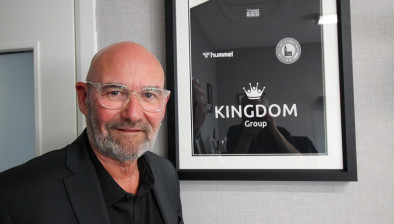Black’s Blog: Avoiding arrears, voids, relets… and failure

Jimmy Black blogs on Riverside Scotland’s Housing First for Families, and Albyn’s Tenancy Sustainment Team.
You’re a busy housing officer, running a patch of 500 homes spread over a wide area. A new tenant appears in your caseload, 17 years old and pregnant. She has never lived on her own before and is struggling to put her abusive ex-partner behind her. She has no carpets or furniture.
Really? Have you got the time, skills and empathy to spend hours with that tenant, guide her towards relevant sources of support, and stick with her through months and years until her life is stable?
Well, probably not. But without that level of support, some people will not be able to sustain their tenancies and the consequences will be harsh, both for them and their landlords. No-one wants to see tenants go through the disruption of a failed tenancy, but let’s look at the landlord’s perspective. I’m thinking about arrears, voids, the cost of relets and time spent signing up another potentially vulnerable new tenant.
Maybe the local authority has family support teams on hand who can provide that service, but if you work in rural areas like the Highlands or Dumfries and Galloway, geographical distances are vast and services are harder to access.
The Scottish Housing News Podcast features Maureen Knight, deputy CEO of Albyn Housing Society, which is based in Invergordon, but ranges all over the north. She is joined by Pamela Forrest, head of housing and communities at Riverside Scotland, which operates in the south west of Scotland. Their organisations are tackling the issue of tenancy sustainment by employing specialist workers to give families the kind of tailored support they need.
Maureen describes Albyn’s early intervention approach. “The minute we’ve identified someone who is coming to us, even before the tenancy starts, a member of the tenancy sustainment team will go and have that first contact to find out as much as they can around what they need to start that tenancy off”. At first, that might be floor covering or a kettle; but as trust develops, prospective tenants may disclose more information which will help Albyn understand how best to support them.
Albyn also provides a tenancy support fund, which helps tenants in various ways. That fund is now bolstered by payments from contractors in an innovative use of “community benefits”.
Pamela’s Housing First for Families service has been running since 2021, aimed at families who are at risk of, or have experienced homelessness. It’s about prevention, but Pamela says, “it’s also there to provide that kind of wraparound support service, bespoke to each and every family, depending on their own personal needs and wishes.” The service recently had a glowing report from the Care Inspectorate; 100% of Riverside’s Housing First for Families clients have sustained their tenancies; and Pamela says the service is here to stay.
Most of the time, I think, being a landlord is relatively simple. You buy or build a home, let it out to someone who pays the rent, fix it when it breaks and relet it when they leave. But housing isn’t just about property. It’s a people business, and social housing is the sharp end of a government intervention which aims to ensure people are well housed.
There will always be people who at some stage of their lives will need support. Helping them stay in their homes makes sense for everyone, landlords included.
Jimmy Black is a City Councillor in Dundee and, until recently, chaired an RSL. He writes in a personal capacity.
The Scottish Housing News Podcast is co-hosted by Kieran Findlay and Jimmy Black. All episodes are available here as well as on the following platforms:







